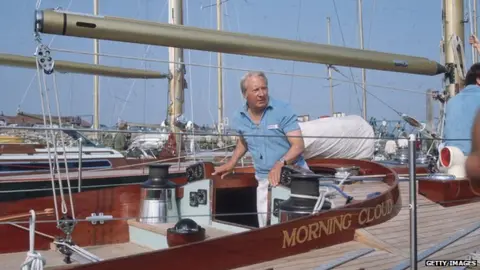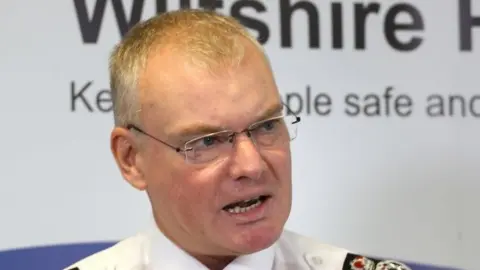Sir Edward Heath 'would have been questioned' over abuse claims
Sir Edward Heath would have been questioned over sex abuse claims if he was alive when they came to light, police have said.
Wiltshire Police launched Operation Conifer in 2015 when the former PM was accused of historical child sex abuse.
The Conservative politician would have been interviewed under caution over seven claims, including the alleged rape of an 11-year-old, they said.
No inference of guilt should be drawn from this, police stressed.
The allegations include one of rape of a male under 16, three of indecent assault on a male under 16, four of indecent assault on a male under 14, and two of indecent assault on a male over 16.
'Paid encounters'
The earliest, dating from 1961 when Sir Edward was Lord Privy Seal, alleged he had raped and indecently assaulted an 11-year-old boy in London "during a paid sexual encounter in private in a dwelling."
Another two of the seven claims relate to "paid sexual encounters."
The Sir Edward Heath Foundation called the report "profoundly unsatisfactory".
In a statement, Sir Edward's former cabinet secretary, Lord Armstrong of Ilminster, and chairman of the Sir Edward Heath Charitable Foundation, Lord Hunt of Wirral, said the report neither justifies or dispels the "the cloud of suspicion".
"All those who knew Sir Edward Heath or worked with him are, without exception, convinced that the allegations of child abuse will all be found to be groundless," it said.
Sir Edward, who led a Tory government from 1970 to 1974, died in 2005, aged 89.
Operation Conifer - which spanned 14 UK police forces - said a total of 42 claims related to 40 different individuals, with alleged offences from 1956 to 1992 - while Sir Edward was an elected MP.
The report concluded there was not enough information to meet the threshold for interview for 19 of the claims.
Among these were two cases where police said there was reason to suspect the individuals "intentionally misled" them. One of the two has been cautioned for wasting police time.
In three further cases, the investigation found that those reporting alleged abuse were "genuinely mistaken" in naming Sir Edward as the perpetrator.
As part of the £1.5m investigation, three people unconnected to Sir Edward were arrested for offences related to child abuse, one of whom is still being investigated.
The Independent Inquiry into Child Sexual Abuse (IICSA) has said it would investigate further.
"In regard to the allegations concerning Sir Edward Heath, the inquiry will investigate whether there was any knowledge within Westminster institutions, and if so, what actions were taken," a spokesman said.
Ahead of the "closure" report's publication, Sir Edward's godson said he believed the investigation was flawed and called for a judicial inquiry into the police's handling of the abuse claims.
Lincoln Seligman, who knew Sir Edward for 50 years, said: "If you make a mass appeal for victims you are sure to get them, whether they are legitimate or not.
"A proper investigation should have taken place, but that's not what happened."
Following the report's publication, Mr Seligman told the BBC: "These are still just allegations and I do not believe them."
 Getty Images
Getty ImagesOther friends of Sir Edward's have also criticised the investigation, and a psychologist who advised detectives claimed it was based on the allegations of a handful of fantasists.
One of Sir Edward's closest advisers told the BBC that the former Conservative leader was "completely asexual".
Lord Armstrong of Ilminster said he "never felt a whiff of sexuality about Ted Heath, whether it was in relation to women, men or children".
North Wiltshire MP James Gray wants the allegations to be fully investigated by a judge-led inquiry, saying there is "no evidence whatsoever in the report".
He added: "This is a terrible cloud hanging over the head of a great statesman and we should take steps as a government to put that right."
Sir Edward's former private secretary Michael McManus, who wrote a biography about him, said he didn't believe there was any evidence of wrongdoing.
He said: "I spent 18 months talking to people who had known him. These allegations were out there and not one person believed them, including people who really didn't like him."
Clinical psychologist Dr Elly Hanson, who was on the independent panel that scrutinised the report for the police, said she "empathises" with supporters of Sir Edward but added that it was right for the allegations to be investigated.

Analysis
By Tom Symonds, BBC home affairs correspondent
Child abuse in the past is extremely difficult to investigate.
The modern staples of detective work - CCTV, forensics, mobile phones - aren't available.
Witnesses may be dead or psychologically impaired. The purity of their evidence may have been tainted by the years between the alleged act and their account being given.
When those accused are famous or powerful, even in the past, and dead, it becomes even harder.
Operation Conifer has gathered a vast amount of evidence - pursuing a total of 1,580 lines of inquiry and it has made public the most serious allegations against the former prime minister, but it can't tell us whether they are true.
More than anything else, this report prompts more questions than it answers.

 PA
PADuring the course of the lengthy investigation, the police have defended their response, with Chief Constable Veale insisting Operation Conifer was neither a "fishing trip" nor a "witch-hunt".
Chief Constable Veale said officers have "gone where the evidence has taken us", whether it supported the allegations or not.
He said: "The report does not draw any conclusions as to the likely guilt or innocence of Sir Edward Heath."
Referring to the political pressure on Operation Conifer to be scaled down or scrapped, Mr Veale said the scrutiny panel overseeing the process said it was "fair, sensitive and rigorous".
He went on to praise the investigation team who had "not buckled under the pressure of relentless external speculation and criticism".
Angus Macpherson, police and crime commissioner for Wiltshire and Swindon, said calls for Mr Veale to resign or be sacked were "fundamentally misjudged".
The findings of the investigation will be passed to the Independent Inquiry into Child Sexual Abuse.

The seven victim disclosures for which Sir Edward would have been interviewed under caution:
- 1961, London: Sir Edward allegedly raped and indecently assaulted boy, 11, during a paid sexual encounter in private in a dwelling
- 1962, Kent: Sir Edward allegedly indecently assaulted a ten year-old-boy during a chance encounter in a public place
- 1964, Sussex and London: Sir Edward allegedly indecently assaulted a 15-year-old boy in three paid sexual encounters
- 1967, Guernsey: Sir Edward allegedly indecently assaulted a 15-year-old boy in a public building
- 1976, Jersey: Sir Edward allegedly indecently assaulted, over clothing, an adult male at a public event
- 1992, Wiltshire: Sir Edward allegedly assaulted an adult male after consent was withdrawn in a hotel
- Between 1990-1992, Wiltshire: Sir Edward allegedly indecently assaulted a male, aged between 12 and 14 years, in private gardens
